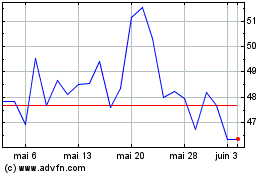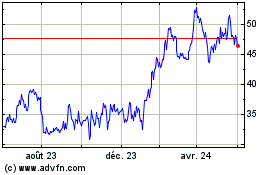Vericel Corporation (NASDAQ:VCEL), a leader in advanced therapies
for the sports medicine and severe burn care markets, today
announced that the U.S. Food and Drug Administration (FDA) has
approved a supplemental Biologics License Application (sBLA)
expanding the MACI® (autologous cultured chondrocytes on porcine
collagen membrane) label to include arthroscopic delivery of MACI
to repair symptomatic single or multiple full-thickness cartilage
defects of the knee up to 4 cm2 in size. MACI ArthroTM provides a
less invasive technique compared to the current approach, allowing
surgeons to evaluate and prepare the defect site as well as deliver
the MACI implant through small incisions using custom-designed MACI
Arthro instruments.
“The approval of MACI Arthro represents another significant
milestone in our strategy to provide innovative solutions for
patients suffering from pain and dysfunction caused by cartilage
defects in the knee,” said Nick Colangelo, President and CEO of
Vericel. “MACI Arthro provides orthopedic surgeons and their
patients with a less invasive option for MACI administration, which
we believe has the potential to significantly increase penetration
into the largest segment of the MACI addressable market and will
support sustained top-tier revenue growth for the Company in the
years ahead.”
MACI is the first FDA-approved cellularized scaffold product
that applies tissue engineering processes to grow cells on
scaffolds using healthy cartilage tissue from the patient's own
knee. MACI is the only restorative biologic cartilage repair
product approved for arthroscopic administration. MACI Arthro
incorporates the advantages of an arthroscopic approach with the
long-term durability and established clinical results of MACI. The
custom MACI Arthro instruments are designed to treat the most
common defects in the MACI addressable market, which are 2-4cm2
defects on the femoral condyles, representing approximately 20,000
patients per year or one-third of the $3 billion addressable market
for MACI. In conjunction with the launch of MACI Arthro, Vericel is
expanding its target surgeon base from 5,000 to 7,000 to include
surgeons that perform high volumes of cartilage repair surgeries,
predominantly through arthroscopic procedures.
“Arthroscopic delivery of MACI represents a significant
advancement in cartilage repair,” said Grant H. Garcia, MD,
Orthopedic Specialists of Seattle. “The technique and
specially-designed MACI Arthro instrumentation provides surgeons
with a less invasive option to administer a clinically-proven
treatment to patients, and may be preferable for patients given the
many post-operative benefits of arthroscopic versus open
surgery.”
About MACIMACI® (autologous cultured
chondrocytes on porcine collagen membrane) is an autologous
cellular scaffold product that is indicated for the repair of
symptomatic single or multiple full-thickness cartilage defects of
the knee with or without bone involvement in adults. The MACI
implant consists of autologous cultured chondrocytes seeded onto a
resorbable Type I/III collagen membrane. Autologous cultured
chondrocytes are human-derived cells which are obtained from the
patient's own cartilage for the manufacture of MACI. For more
information, please visit www.maci.com.
Indication: MACI is an autologous cellularized
scaffold product indicated for the repair of single or multiple
symptomatic, full-thickness cartilage defects of the knee with or
without bone involvement in adults.
Limitations of Use:
- Effectiveness of
MACI in joints other than the knee has not been established.
- Safety and
effectiveness of MACI in patients over the age of 55 years have not
been established.
Important Safety Information
-
Contraindications: MACI is contraindicated in
patients with a known history of hypersensitivity to gentamicin,
other aminoglycosides, products of porcine or bovine origin, in
patients with severe osteoarthritis of the knee, inflammatory
arthritis, inflammatory joint disease, or uncorrected congenital
blood coagulation disorders, in patients who have undergone prior
knee surgery in the past 6 months, excluding surgery to procure a
biopsy or a concomitant procedure to prepare the knee for a MACI
implant, or in patients unable to cooperate with a
physician-prescribed post-surgical rehabilitation program.
- Warnings and Precautions:
- Malignancy: The risk of MACI in patients with malignancy in the
area of cartilage biopsy or implant is unknown. Expansion of
malignant or dysplastic cells present in biopsy tissue during
manufacture and subsequent implantation may be possible.
- Transmissible infectious diseases: Because patients undergoing
procedures associated with MACI are not routinely tested for
transmissible infectious diseases, cartilage biopsy and MACI
implant may carry risk of transmitting infectious diseases.
- Presurgical Comorbidities: Local inflammation or active
infection in the bone, joint, and surrounding soft tissue, meniscal
pathology, cruciate ligament instability, and misalignment should
be assessed and treated prior to or concurrent with MACI
implantation.
- Product Sterility: Final sterility test results are not
available at the time of shipping.
- Adverse Reactions: The most frequently
occurring adverse reactions reported for MACI (≥5%) were
arthralgia, back pain, joint swelling, and joint effusion. Serious
adverse reactions reported for MACI were arthralgia, cartilage
injury, meniscus injury, treatment failure, and
osteoarthritis.
- Specific Populations:
- Use of MACI in pediatric patients (younger than 18 years of
age) or patients over 65 years of age has not been
established.
- The MACI implant is not recommended during pregnancy. For
implantations post-pregnancy, the safety of breastfeeding to an
infant has not been determined.
- To report negative side effects, contact Vericel Corporation at
1-800-453-6948 or FDA at 1-800-FDA-1088 (1-800-332-1088) or
www.fda.gov/medwatch.
- Please see
Full Prescribing Information.
About Vericel Corporation Vericel is a leading
provider of advanced therapies for the sports medicine and severe
burn care markets. The Company combines innovations in biology with
medical technologies, resulting in a highly differentiated
portfolio of innovative cell therapies and specialty biologics that
repair injuries and restore lives. Vericel markets three products
in the United States. MACI is an autologous cellularized scaffold
product indicated for the repair of symptomatic, single or multiple
full-thickness cartilage defects of the knee with or without bone
involvement in adults. Epicel® (cultured epidermal autografts)
is a permanent skin replacement for the treatment of patients with
deep dermal or full thickness burns greater than or equal to 30% of
total body surface area. Vericel also holds an exclusive license
for North American rights to NexoBrid® (anacaulase-bcdb), a
biological orphan product containing proteolytic enzymes, which is
indicated for eschar removal in adults and pediatric patients with
deep partial-thickness and/or full-thickness burns. For more
information, please visit www.vcel.com.
Epicel and MACI are registered trademarks of Vericel
Corporation. MACI Arthro is a trademark of Vericel Corporation.
NexoBrid is a registered trademark of MediWound Ltd. and is used
under license to Vericel Corporation. © 2024 Vericel Corporation.
All rights reserved.
Forward Looking StatementsVericel cautions you
that all statements other than statements of historical fact
included in this press release that address activities, events or
developments that we expect, believe or anticipate will or may
occur in the future are forward-looking statements. Although we
believe that we have a reasonable basis for the forward-looking
statements contained herein, they are based on current expectations
about future events affecting us and are subject to risks,
assumptions, uncertainties and factors relating to our operations
and business environment, all of which are difficult to predict and
many of which are beyond our control. Our actual results may differ
materially from those expressed or implied by the forward-looking
statements in this press release. These statements are often, but
are not always, made through the use of words or phrases such as
“anticipates,” “intends,” “estimates,” “plans,” “expects,”
“continues,” “believe,” “guidance,” “outlook,” “target,” “future,”
“potential,” “goals” and similar words or phrases, or future or
conditional verbs such as “will,” “would,” “should,” “could,”
“may,” or similar expressions.
Among the factors that could cause actual results to differ
materially from those set forth in the forward-looking statements
include, but are not limited to, uncertainties associated with our
expectations regarding future revenue, growth in revenue, market
penetration for MACI, MACI Arthro, Epicel, and NexoBrid, growth in
profit, gross margins and operating margins, the ability to
continue to scale our manufacturing operations to meet the demand
for our cell therapy products, including the timely completion of a
new headquarters and manufacturing facility in Burlington,
Massachusetts, the ability to achieve or sustain profitability,
contributions to adjusted EBITDA, the expected target surgeon
audience, potential fluctuations in sales and volumes and our
results of operations over the course of the year, timing and
conduct of clinical trial and product development activities,
timing and likelihood of the FDA’s potential approval of the use of
MACI to treat cartilage defects in the ankle, the estimate of the
commercial growth potential of our products and product candidates,
competitive developments, changes in third-party coverage and
reimbursement, surgeon adoption of MACI Arthro, physician and burn
center adoption of NexoBrid, supply chain disruptions or other
events or factors affecting MediWound’s ability to manufacture and
supply sufficient quantities of NexoBrid to meet customer demand,
including but not limited to the ongoing Israel-Hamas war, negative
impacts on the global economy and capital markets resulting from
the conflict in Ukraine and the Israel-Hamas war, adverse
developments affecting financial institutions, companies in the
financial services industry or the financial services industry
generally, global geopolitical tensions or record inflation and
potential future impacts on our business or the economy generally
stemming from a resurgence of COVID-19 or another similar public
health emergency.
These and other significant factors are discussed in greater
detail in Vericel’s Annual Report on Form 10-K for the year ended
December 31, 2023, filed with the Securities and Exchange
Commission (SEC) on February 29, 2024, Vericel’s Quarterly Report
on Form 10-Q for the quarter ended June 30, 2024, filed with the
SEC on August 1, 2024, and in other filings with the SEC. These
forward-looking statements reflect our views as of the date hereof
and Vericel does not assume and specifically disclaims any
obligation to update any of these forward-looking statements to
reflect a change in its views or events or circumstances that occur
after the date of this release except as required by law.
Investor Contact:Eric Burnsir@vcel.com+1 (734)
418-4411
Media Contact:Julie Downsmedia@vcel.com
Vericel (NASDAQ:VCEL)
Graphique Historique de l'Action
De Nov 2024 à Déc 2024

Vericel (NASDAQ:VCEL)
Graphique Historique de l'Action
De Déc 2023 à Déc 2024
